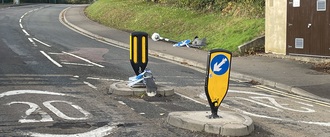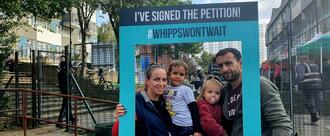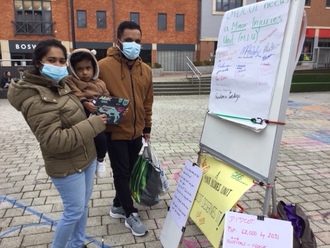-
BAN SCOTTISH SALMON IN SCOTTISH SCHOOLSCurrent cautionary guidance from Food Standards Scotland(FSS) is clear, but requires further updating following new data from the European Food Standards Agency, suggesting the exposure of young people to farmed Scottish salmon needs to be further reduced. The most up to date guidance concerning oily fish consumption can be found on the FSS website. This recognises that these fish can contain low levels of pollutants that can build up in the body. For this reason, there are maximum recommendations for the number of portions some groups should be eating each week. The following people should eat no more than 2 portions of oily fish a week: - girls - women who are planning a pregnancy and women of reproductive age - pregnant and breastfeeding women This is because pollutants found in oily fish may build up in the body and affect the future development of a baby in the womb. Pilgrim House, Old Ford Road, Aberdeen, AB11 5RL www.foodstandards.gov.scot However, a recent study in Europe found that exposure to these chemicals may need to be reduced by up to 75%, for both boys and girls. Meaning that children should be consuming no more than 50gms of farmed salmon per week. https://efsa.onlinelibrary.wiley.com/doi/10.2903/j.efsa.2018.5333 Current Government policy is to promote increased consumption of farmed Scottish Salmon in schools. Scottish salmon also has a range of very severe environmental impacts on Scotland: - https://archive2021.parliament.scot/S5_Environment/Inquiries/20180305_GD_to_Rec_salmon_farming.pdf - https://www.facebook.com/issf.org.uk/videos/373 of 400 SignaturesCreated by Healthy Scotland
-
Stop the clinically vulnerable from having to risk their lives to get the Covid drugs they needToday there are over 3 million people in the UK who are still clinically extremely vulnerable to Covid. Not only do our underlying health conditions put us at greater risk for severe disease or death, immunosuppression can cause the Covid vaccines to be less effective. Not all of us are mounting immune response to vaccinations, even after four doses, and as of October 2021, 91% of us were still shielding, nearly two years into this pandemic. Right now the only protection the government is offering us is post-Covid infection: We are being asked to take our chances of getting the disease, which may be deadly for many of us, before we can access antivirals or monoclonals to help our chances of survival. We need a vaccine equivalent that protects us proactively so we can go back to living our lives safely. Without this, we live an isolated and perilous existence. Some other countries have already approved monoclonal antibody treatments such as AstraZeneca's Evusheld as prevention against infection for the immunosuppressed community. We ask that these be fully approved, distributed and provided as long-term prophylaxis treatment to the clinically vulnerable in the UK.1,306 of 2,000 SignaturesCreated by Shannon Banks
-
Combat local suicides nowOur local leaders need to know that this can not keep happening and that more needs to be done. They will only act on things if enough of us feel the same way. So please if your sick of waking up to the news of young local people tragically killing themselves get this signed. Its a matter of time before this issue effects you personally if it already hasn't.607 of 800 SignaturesCreated by Rikki Turner

-
Safe Crossings for St Mary’s and RUHThe Penn Hill Road crossing at the Bowls Club is not fit for purpose. It needs upgrading to a highly visible zebra crossing. It has be the site of several 'near miss' incidents, most recently when it was completely driven over by a vehicle, the centre light column being flattened. Every school day hundreds of people cross here for St Mary's School, WASPS, the RUH, the 103 Club nursery and wrap around care, and Oldfield School. It is the route of the 'walking bus' for primary school children, and children under 11 make up own average 40% of users at peak times on school days. The specific problem: - Poorly located at pavement pinch points - Poorly designed with a tiny central island where people end up trapped with children and pushchairs - Confusing to drivers and crossing users - Heavily used by children - Not conspicuous enough - Clearly damaged from vehicle collisions - It is an accident black spot - It has been hit at least twice in recent years and there was another miss when two vehicles nearly collided. Everyone and especially children need a safe environment in which to walk (or cycle or scoot). The current poor crossing arrangements do not support council policies to enable healthy and active lifestyles, such as the ‘5 Minute Walking Bubble’. The recent collision demonstrates why this matter is so pressing.428 of 500 SignaturesCreated by Guy Hodgson
-
#WhippsWontWaitWe welcome the government's commitment made two years ago to build a new hospital at Whipps Cross. The July flooding that closed the A&E, evacuated nearly 100 patients, and prevented hundreds of essential operations showed once again the dire condition the hospital is in. The staff that have performed heroically throughout the pandemic, and the people of north east London and beyond deserve and need a new hospital now. The government is deciding which hospitals receive money first and that needs to be Whipps Cross. Sign the petition to secure our new hospital now. #WhippsWontWait11,185 of 15,000 SignaturesCreated by Waltham Forest & Redbridge Council
-
Say no to the removal of Rugby's last ambulanceWest Midlands Ambulance Service (WMAS) wishes to remove the last ambulance station in Rugby. Rugby is a rapidly expanding town and my family has direct experience of long waiting times in an emergency for the ambulance to arrive. With the removal of that ambulance the waiting times for people in this town will get worse and the risk is someone will needlessly lose their life while waiting for an ambulance. In addition Rugby is close to the M6 M1 A14 and A45 - all known for a high number of RTCs. We want the WMAS to stop this plan and think again. We want to be consulted on changes because we, the residents of the town, pay for this service through our taxes. We want to ensure there is adequate healthcare for the residents of our town. Our public services are being relentlessly degraded at a time the population is growing. Enough is enough.5,619 of 6,000 SignaturesCreated by Alison Livesey
-
Provide Paid leave for those who lose a baby prior to 24 weeks gestationDid you know that your female employees who lose a baby under 24 weeks are not entitled to paid leave? Well. You might argue that they are entitled to SSP. Is that really comparable to their wages? How many employees could afford to be off work with the first 3 days unpaid and then live off £96.35 per week? Not many I bet. This is what is happening across the U.K. - employees are grieving, they are suffering physically, mentally & financially. I lost my daughter at 23 weeks And whilst 2 weeks was not enough, it is better than the nothing being offered currently.9,271 of 10,000 SignaturesCreated by Taylor Moss
-
Keep prescriptions free for Over 60sThe Government wants to move the age people can get free prescriptions up from 60 to 66 years old. This is directed to anyone in England. The devolved governments have chosen to offer free prescriptions for all. Raising the age at which free prescriptions are offered would further increase this disparity. Many women have been hit twice by the increases to state retirement age, please do not add a third. As this only applies to England, it makes such a change even more burdensome as less than 10% of prescriptions are actually paid for. The over 60s suffer increasing health problems, that could be exacerbated if prescriptions needed to be paid for. People could choose not to pay, which then puts a greater burden on the NHS. This is a shortsighted idea that needs to be nipped in the bud now.194,997 of 200,000 SignaturesCreated by Serena Martin
-
Save Warrior PharmacyIn total, more than 16,000 patients are registered at st leonards medical centre and many use warrior pharmacy due to ease of location and due to the outstanding, knowledgeable staff. Losing the ability for the pharmacy within the medical centre to dispense NHS prescriptions from site and to deliver them to the many vunerable and elderly patients would be a travesty. Many patients travel to the medical centre pharmacy specifically due to their longstanding professional relationship with Brent the Pharmacist there of over 20years.1,218 of 2,000 SignaturesCreated by Michelle crane
-
Toothless in Suffolk - An NHS Dentist For Everyone!Communities across Suffolk are suffering from NHS dentist closures and the widespread lack of accessible NHS dentistry provision. Health inequality in Suffolk continues to rise. Patients are being put at considerable inconvenience and distress. The physical and mental pain suffered by those who are unable to find an NHS dentistry provider local to them, has all too often been matched by the financial hardships of being forced to 'go private' as practices are not taking on NHS patients. A Campaign Group has been put together to hear testimony and urge 'NHS England and NHS Improvement (East of England)' to reinstate local NHS dentistry provision in Suffolk. We are calling for the full restoration of NHS dentistry services in Suffolk. The NHS was founded in 1948 as a free-to-all service. We want it back! https://www.facebook.com/groups/suffolkteeth https://twitter.com/SuffolkTeeth3,737 of 4,000 SignaturesCreated by Mark Jones
-
Didcot needs a Minor Injuries Unit nowDidcot has no walk-in urgent health care facility. Didcot’s population is currently 32,800 (official estimate) and because of the many surrounding villages, there are over 44,000 patients registered with its 3 GP surgeries. Further rapid growth in housing is planned over the next decade. The nearest MIU is 7 miles away at Abingdon; a 30-40 minute bus ride or an expensive taxi journey for anyone without a car. The journey is even more difficult for those living in one of the villages, for example, Hagbourne, Blewbury, Upton, Harwell or Moreton. There are Minor Injuries Units at Witney (pop: 30,500) which is smaller than Didcot and Henley-on-Thames (pop: 11,900) which is less than half the size of Didcot. Even little Wallingford (population: 8,250) has a First Aid Unit. Didcot deserves better!332 of 400 SignaturesCreated by Carol Stavris
-
Please ensure that GPs in NHS Surrey Heartlands CCG complete training in the MenopauseMenopause affects half of all patients GPs see on a day to day basis but sadly many women do not receive the support they so desperately need. 1 out of 4 women experience debilitating symptoms that affect their quality of life, with many giving up work or reducing their hours in order to cope. 50% of menopausal women say they feel depressed and are often misdiagnosed and given antidepressants. One third of women visiting their GP are not even made aware of HRT. Many women are incorrectly denied HRT due to existing or family health concerns. Many women are fearful of asking for HRT because of the widespread belief that it causes breast cancer, thanks to the headlines from 2002 when a flawed study incorrectly stated there was a link. Despite the study being discredited, this belief has continued to this day. As a result of these misunderstandings, only 1 in 10 women choose to use HRT. My experience of menopause started around 10 years ago and I consider myself to be in the 25% of women who experience debilitating symptoms that can change lives. I have experienced a myriad of symptoms, many of which I consulted various GPs about, resulting in x rays, ultrasounds, heart monitors and antidepressants. Not once was menopause mentioned. Despite my request for HRT to help with hot flushes and night sweats, I was advised not to use it because of the increased risk of breast cancer. Two years ago my symptoms became considerably worse, so again I sought HRT, this time successfully, but my GP was unfamiliar with the up to date products I should have been prescribed and gave incorrect information. I ended up having to pay a private Menopause Specialist for correct dosages. I have since developed a chronic condition related to menopause that so far no GP has been able to help me with. The right advice early on would have made a huge difference, but sadly it wasn’t forthcoming. Instead, it has taken many expensive appointments with private specialists to try and improve my health and I am still struggling. Luckily, I can afford to pay for expertise but many women do not have this financial luxury. Instead, they continue to suffer having been refused HRT by their NHS doctor, and have nowhere else to turn for help. My struggle has lasted about 10 years so far, but how much misery could have been avoided if even one of my GPs was fully up to date on research, symptoms and treatment? Unfortunately, experiences such as mine are all too common, and something needs to change. The frustrating thing is that HRT is so beneficial and can protect women from many chronic conditions including dementia, heart disease, Alzheimers, colon cancer and osteoporosis. Surely we should be encouraging all women to think about using it to help them live longer, healthier lives? The financial savings to the state would be huge in terms of reduced health care costs. Employers would also benefit from having highly skilled women stay in their workforce instead of losing them as they struggle to cope with their symptoms. And of course the benefits to the women themselves and their families would be huge. Menopause affects everyone. On 13 May 2021 I was shocked to read that a survey of 33 university medical degrees, carried out by menopause campaigner Diane Danzebrink, revealed that 41% of the courses did not have any menopause education on the curriculum. How many medical students are therefore leaving without any knowledge of the menopause at all? Some will go on to specialise in general practice where I believe the menopause module of their training is voluntary. How many newly qualified GPs take up positions in the community, in our area, with no knowledge or training whatsoever? I find it staggering in this day and age that the needs of women are deemed so unimportant that doctors are not required to complete training on the one thing that affects all women. I’m sure if something affected the health and well being of every single man in the population that a solution would have been found long ago. We are therefore asking you to do everything in your power to improve the training given to our GPs. A woman needs to be able to go to her GP and receive up to date and accurate information about the menopause, its symptoms and how it can be managed, in order to improve the quality of her life and long term health. The Menopause Charity has just been launched and its goal is to provide up to date information to women, GPs and other health practitioners. For the next year they are giving away one free place per GP practice on an accredited professional development course called, ‘Confidence in the Menopause’. I urge you to request that all GP practices take full advantage of this offer to ensure that there is at least one menopause specialist in every practice as soon as possible, and that other GPs are required to complete the training over the course of the year. This would be an excellent step forward which would impact positively on all the women within your region and on your budgets. For more information the link is below. https://www.themenopausecharity.org/training/ Thank you so much for reading this. We hope you agree that the training of our GPs in this very important and much neglected area needs to be addressed. Cate O’Neill229 of 300 SignaturesCreated by Cate O'Neill

Hello! We use cookies to improve your experience by providing insights into how the site is being used. Find out more.




.png)







